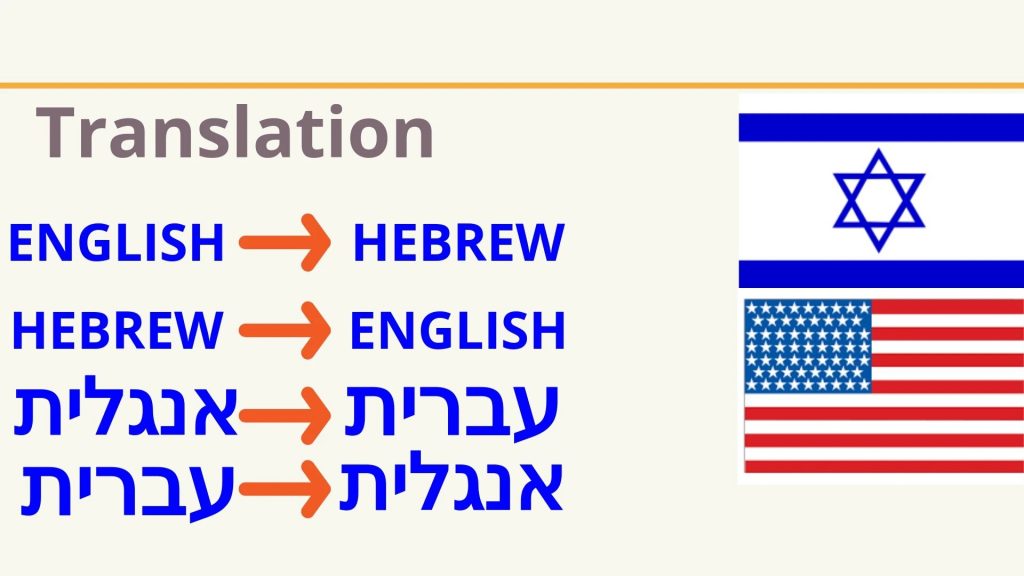
Translating anything can be tricky because if it is not done by a professional, the target audience will know that it is a poorly translated document. The task becomes even more critical what to know before you translate hebrew to english because Hebrew is a multifaceted language.
Table of Contents
Plain English translation or word-to-word translation will not do justice to the depth of meaning in the Hebrew language. Also, the translator needs to keep a couple of factors in mind before making any attempt at the translation of the document.
Things To Keep in Mind As You Translate Hebrew to English

Whether you are a professional translation service, fixing the crappy job done by an online machine translation, or attempting translation in a personal capacity – here are some things to keep in mind before you start the translation and as you proceed with the task:
Know Your Audience
The percentage of people who speak Hebrew is very little as compared to English. So, while it is easy to understand the demographics of Hebrew speaking population, it can be a big mission to understand the needs and requirements of the people who are going to read the final translated document.
It is best to know your audience and for what purpose they will be reading your translated document. Understanding their motivation for reading the Legal translation JLT work will make it easier for you to write in a tone that will be most effective.
You might be surprised to find the perfect after Israel, the United States of America is the country where most Hebrew native speakers reside. As it is obvious, the tone of writing that will work for someone living in Israel might not be very suitable for an American resident.
Working Around Deadlines
A translated document where the translator had considerable time at hand to translate Hebrew to English will be different from a work where he or she had to work under a strict and short deadline.
So, before committing to any work, it is best if you know the deadline so that you can plan your task accordingly to avoid any hasty work. Remember to reserve sufficient time for proofreading and any unforeseen circumstances.
Proofread
Proofreading is the key to an error-free translated document. Even with years of experience and thorough care, there might be some instances of human error that are overlooked. It is best if someone else can proofread the work as a fresh pair of eyes can spot errors that may not be obvious to someone who is re-reading the document.
If the same person who is translating the document happens to proofread it, it is recommended to have a little break between the translation service and proofreading. Read the document out loud slowly so that anything that feels unnatural to a speaker can be easily spotted.
Differentiating Personal and Work Documents
Many Hebrew documents might be related to religious work, but that might not always be the case. You may be translating an official document for a business or a work contract. So, you must understand the difference between personal documents, legal documents, and official or work-related documents and proceed with translation accordingly.
Special Terminologies
Even when a document is translated, certain terminologies are either kept the same as the original language or they are provided in footnotes along with an explanation for them. So, ask the client if there are certain terms that they would like to leave untranslated.
Also, if you are unfamiliar with some special terms, it is a better option to research them and understand their context before attempting a literal legal translation services company. If such terms are translated, they lose their essence altogether. This may confuse a native speaker who may be well-acquainted with the original terminology but may not fully understand what the context of that word in the translated document is.
Culturally-Sensitive Words
Since the Hebrew language is largely used for religious scriptures and has many words that hold cultural and religious significance, so it is not a straightforward task to translate Hebrew to English. It may be difficult for a non-native speaker to identify such terms and words.
If you do not have full proficiency in Hebrew and English, it is advised to do research on culturally-sensitive words. Knowing these words, you should approach them cautiously so as not to change their context. It is best to check such words with a native speaker before you submit the final translated work.
Limiting Personal Touch
There are a number of ways of translating a document and every translator has a certain personal touch that they add to the translated document. This does not necessarily mean that their work is wrong.
However, every effort must be made to limit the personal touch, especially in official and legal documents. While machine translation is totally literal, human translation has a natural flow to it. We do not advocate removing this natural flow; however, the document must be easy to read and understand for a wide variety of audiences.
Learning From Mistakes
One of the most underrated ways of improving your translation work is to learn from your own mistakes. How about you ask the client for feedback and any areas where you can improve the quality of your work?
This will highlight some things that you may not have considered changing. Even if they are not mistakes, there is always room for improvement that you can utilize to make your translation work better.
Such a gesture of following up after the successful project is likely to get you positive reviews. This will let your customers know that you take your work seriously and are committed to improving the quality of output.

Summing It Up
While most inter-language translations are similar in many ways, we have listed certain factors that you need to keep in mind as you Document Translation Service In Dubai Hebrew to English language. If you sense check these points, your translation should be perfect in all aspects







